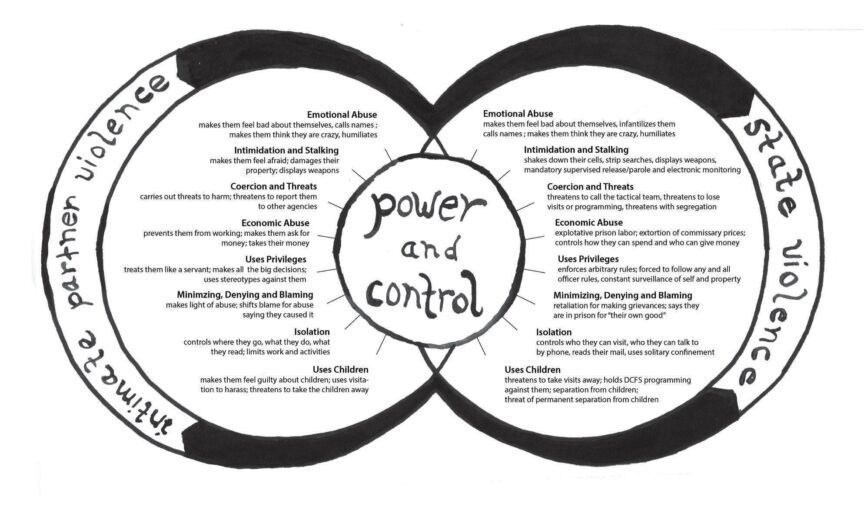Carceral Feminism Isn’t the Answer to Sexual Violence

On 3 March 2021, Sarah Everard was walking home from a friend’s house in south London when she was abducted, raped and murdered by police officer Wayne Couzens. Months later, in response to her murder, the Metropolitan Police announced it would place an additional 650 police officers on the streets. Justice secretary Dominic Raab explained that the increased police presence was intended to make women feel safe enough to “walk home at night without having to look over their shoulder”.
The state’s response offered a depressingly familiar contradiction: while it was a police officer who abducted, raped and murdered Everard, the state leveraged the moment to justify the expansion of police power in the name of women’s safety. This response to Everard’s death is not without precedent. For decades the state and its accomplices in the anti-violence moment have invested enormously in policing and prisons as a means of addressing sexual and gendered violence despite police and prisons operating as primary producers of such violence.
Underpinning the reaction to Everard’s murder is carceral feminism, an ideology that views the criminal legal system as the principal arbiter of gendered violence, leveraging the credibility of feminist movements to advocate for widened definitions of criminalised behaviour, lengthier prison sentences, expanded police powers and prison funding.
While the left has generally advocated curbing prison expansion and shrinking the scale of the police state, many have held on to the belief that prisons remain a necessary feature of our society for people who have committed uniquely violent acts, in particular rape and murder. In refusing to ground in an abolitionist politic, the left has been complicit in our continued reliance on the prison-industrial complex. Everard’s murder exposes the limits of this logic and presents an opportunity to expand our world-building beyond permanent carcerality.
A 1.6% hit rate.
Abolitionist feminism begins with the belief that our policing and prison systems are failing survivors. The evidence supports this idea. Decades of massive expansion of the carceral state has not eliminated sexual violence in our communities. According to the Ministry of Justice’s own figures, only 15% of people who experience sexual violence report it to the authorities. Of the small percentage of people who do, just 1.6% resulted in a charge or summons.
Low reporting rates, botched investigations and re-traumatisation through interrogation and trial (for the few who make it that far) – the criminal legal system offers a long, trauma-ridden and ineffective path to incarcerate a single rapist. The continued investment in policing and prisons has resulted in the mass abandonment of survivors, the vast majority of whom will never utilise the criminal legal system being continually expanded to protect them. Yet it is not just that police and prisons are ineffective tools against sexual and gendered violence. It is that they themselves produce it.
Criminalising survivors.
Often, policies introduced in the name of protecting women expand state violence against them. Paradoxically, victims of sexual violence are far more likely to be punished by the criminal legal system than to secure a conviction of the person who harmed them. As many as 90% of people held in US women’s prison facilities have experienced sexual or domestic violence.
Also in the US, anti-violence campaigns in the 1980s and 90s led to policies that required police responding to domestic violence calls to make an arrest. These policies resulted in a 60% increase in the arrest of men and a 400% increase in the arrest of women. Victims of domestic violence had limited access to alternative modes of intervention and resources, and domestic homicide rates increased. The Prison Reform Trust found similar trends in the UK following the passage of expanded police powers under the Domestic Abuse Act. We know that this heightened criminalisation of survivors is compounded by existing precarities for those positioned in the underside of race, gender, class, and immigration status hierarchies.
For some, anti-prison politics grew out of anti-violence movements and work within rape crisis centres – particularly by communities who saw that the collaboration between rape crisis centres and the state made these resources unusable and even themselves violent for survivors, including immigrant women who have been arrested and deported after calling police to intervene in domestic violence cases. The contemporary abolitionist movement has grown out of disillusionment with these services and visions of futures liberated from both gendered and state violence.
Prisons and police perpetuate and perpetrate rape.
Prisons and police not only criminalise survivors of sexual violence – they are sexual violence. The projects of eliminating sexual violence and dismantling the prison-industrial complex, then, are one and the same.
Sexual assault is a routine feature of arrest. Despite being notoriously underreported, more than 2,000 sexual misconduct allegations have been made against UK police in the last four years alone. In the US, sexual misconduct is the second most common report made against officers, after excessive force.
Once someone is incarcerated, their vulnerability to sexual violence is even greater. Prisons create the conditions of nearly constant and unlimited access to an incarcerated person’s body. Worse still, they do so with our collective consent: the prevalence of prison rape jokes in our culture indicates a common understanding that prisons are a site of sexual violence and that rape is part of our national punishment strategy.
Building upon the work of the anti-domestic violence movement, Monica Cosby, a Chicago organiser who survived 20 years of incarceration, has illustrated how prisons and police mirror and reproduce forms of interpersonal violence. Legal scholar Beth Richie alludes to this parallel when she says that, “prisons” – like abusive partners – “leave you walking on eggshells”, knowing you may be punished using arbitrary and constantly changing rules. While incarcerated, a person is made to constantly negotiate sexual violence, from corrections officers as well as other incarcerated people, as a survival practice and as abuse embedded into the functioning of the criminal legal system.

In the wake of Everard’s murder, a number of feminist groups organised self-defence classes, teaching necessary skills for women to protect themselves from rape and abduction. But as Eleanor Penny notes, when the prisons and police are the rapists, self-defence “can get you jail time”. Sexual violence at the hands of police or corrections officers is not “a product of physical weakness”, she adds, but “a product of structural vulnerabilisation, chronic exposure to violence, and a system that empowers attackers at every opportunity.”
Invest in our experiments.
In November, the feminist direct action collective Sisters Uncut published an open letter to the Royal Court of Justice. “Today we withdraw our consent to police power,” they wrote. “The police claim Wayne Couzens was one bad apple, a lone monster, but we know 15 officers have killed women since 2009. … There is an epidemic of impunity protecting the police across the entire criminal justice system. From the streets to the courts: the whole system is guilty.”
As we indite police and prison systems for orchestrating sexual violence against us, we unearth an enormous contradiction in feminist demands for the incarceration of rapists, and in all attempts to seek justice within the institutions of state violence. When we are moved by rage and fear to chant “lock him up”, we justify the maintenance and expansion of the prison-industrial complex in our name. It is in our most vulnerable moments that carceral feminist logics seep into our politics, and derails abolitionist world-building.
We want a society that:
1. Tackles the root causes of crime, regardless of cost. Most women are in prison for crimes of survival. Most violence is correlated with what are solvable social problems (e.g. archaic drug legislation) 2
— Sisters Uncut (@SistersUncut) January 25, 2022
Rather than relying on institutions of state violence to address sexual violence, abolitionists understand that the two are one and the same and organise to abolish both. Abolitionist feminism asks that we radically reorient our communities, divesting from systems of state violence and investing in non-carceral resources that strengthen our communities.
People around the world, particularly those in communities that experience hyper-policing, are exploring community-based safety and wellbeing practices outside of the carceral state. Sisters Uncut has organised CopWatch training, taking seriously the need to monitor and, where possible, intervene in state violence. Projects like Creative Interventions and One Million Experiments are building upon and archiving existing conflict resolution, de-escalation and bystander intervention skills already in our communities. Groups like Cradle Community in the UK and Project Nia in the US are training practitioners in transformative justice, supporting communities to heal from violence.
The police and prison systems have had hundreds of years and billions of dollars to “reform” and “modernise” a lack of money and time was never the problem. Leftists must abandon their futile attempts to bend the carceral system to their will. It is our abolitionist experiments, not their carceral structures, that deserve space, time and funding, we that deserve the opportunity to fail, because as California criminologist Mimi Kim reminds us, “We can’t mess up more than the cops.”
Caren Holmes is an abolitionist organiser and educator based in New York City.


